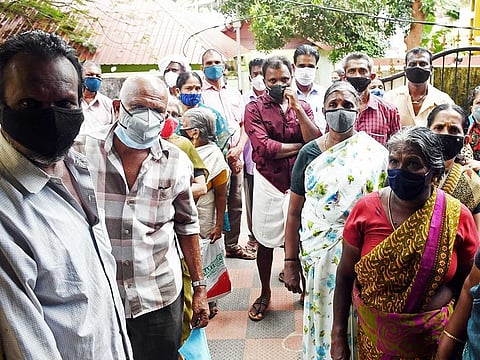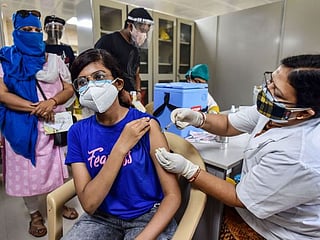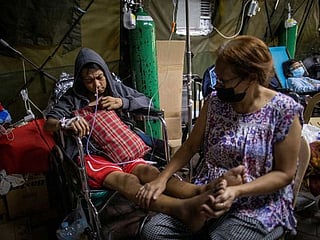India: High COVID-19 numbers in Kerala is only half the picture
Experts say state needs to be more cautious because nature of the coronavirus has changed

Thiruvananthapuram: A sharp debate in India over the past few months has been whether Kerala, the early front-runner in India’s COVID-19 fight, is actually a role model or a failure that was spotted late.
The reason for the debate is quite plain as the coronavirus-affected numbers have stayed steadily high in Kerala while the curve has declined in almost every part of the country barring an odd-state like Maharashtra in recent weeks.
This is in sharp contrast to the early days of the pandemic when Kerala was considered the model for other states to emulate in flattening the curve.
Numbers condemn Kerala
At first glance the numbers paint Kerala in poor light. On Tuesday, Kerala had the highest number of cases in the country, a trend that has prevailed in recent days.
On Tuesday, Kerala reported 20,337 fresh cases, followed miles behind by Maharashtra, which had 6,466 cases. Every other state in India had cases fewer than 2,000, underlining the contrast Kerala presently draws with the rest of the country.
The weekly national figures are more stark. According to the federal health ministry, Kerala accounted for as much as 49.85 per cent of all new cases reported in the country last week. It is also the only state which has more than 100,000 patients under treatment.
There are only 18 districts in India that are reporting a spike in cases, of which 10 are in Kerala. Many other states are even reopening schools. Punjab has begun classes for school children, while Uttar Pradesh is planning to restart schools on August 16. In contrast, Kerala has no plans to open schools before the Onam festival which falls later this month.
Lockdown cut both ways
Kerala’s stringent lockdown measures did flatten the pandemic curve and prevented the spread of the virus. However, it has also left people in the state most susceptible to the virus now, with herd immunity virtually absent.
The Kerala chapter of the Indian Medical Association (IMA) had been pushing for relaxations in the lockdown in order to avoid crowding at shops and other establishments but the state government defiantly stuck to its tight shutdown policy. IMA had recommended opening of shops on all days, including Sundays if possible in order to avoid crowding.
It was only on Tuesday that the government finally relented to expert advice and declared easing of lockdown norms and lifting curbs on Saturdays.
Not as it looks
Experts, however, point out that the latest patient numbers do not give the right picture. They say that Kerala’s efficient early handling of the pandemic was so effective that the state has not developed a herd immunity like in many other states where the pandemic played havoc and people developed anti-bodies. This, they say, is why Kerala now has more new patients than other parts of the country because the spread was arrested most efficiently in the state.
But Kerala needs to be more cautious because the nature of the virus has also changed. “We feel the incubation period of the virus has reduced. Earlier when it spread, the manifestation of the virus would take 4-5 days. But today within 48 hours the patient starts spreading the disease,” IMA state secretary Dr P. Gopikumar told Gulf News.
One encouraging factor is that new cases are relatively less severe on patients, perhaps because vaccination has also improved. “We don’t have very serious cases now which require hospitalization or ICU. Such cases are less, and deaths due to COVID-19 are also less at hospitals”, Dr Gopikumar says.
According to him, there is no overload on the healthcare establishment, and hospitals are “easily able to manage the situation”. The point to note is that only some 30 per cent of the people have contracted the disease and so the large majority are still susceptible. “The large majority of the population have neither had vaccination nor have antibodies”, he says.
Unhealthy profile
Rajiv Vasudevan, MD and CEO of AyurVAID, a leading ayurvedic hospital and services provider in the state, feels the poor physical profile of the average Keralite is a matter of concern.
“Most people in Kerala are obese, have very poor metabolism and very bad eating habits. The alcohol consumption, the meat consumption and the sedentary lifestyle all point to a sociological transformation, and we are missing the underbelly of the society”, Vasudevan told Gulf News.
He says that while aspects like the longevity of Keralites is highlighted, the public health underbelly is often forgotten. “Like New York had a focused strategy on curbing fast foods, Kerala too needs a health consciousness movement”, says Vasudevan.
Single weapon
Kerala may have done many things right in the early stages, but it hasn’t been a leader in vaccination. “The only weapon against the pandemic is vaccination. Ironically Kerala is getting very few supplies from the federal government”, says Dr Gopikumar.
New cases may still be hovering in the range of 20,000 per day, but the severity of the disease appears to be reducing in Kerala, too. On Wednesday, Kerala health minister Veena George informed the state assembly that the number of patients seeking treatment at hospitals and those needing ICU support had dwindled.
Sign up for the Daily Briefing
Get the latest news and updates straight to your inbox







